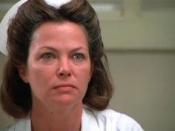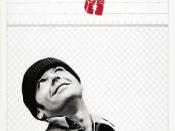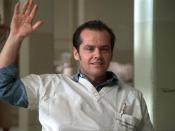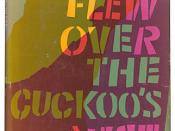One Flew Over the Cuckoo's Nest One Flew over the Cuckoo's Nest is a compelling novel that challenges the reader's perception of sanity and insanity. This novel examines the issue of sanity in a somewhat modern society. Kesey illustrates the workings of a mental hospital and the affect of these workings on the people in the hospital. In One Flew Over the Cuckoo's Nest Kesey reverses control in the mental hospital by proving the patients can show more sanity than those who are in control of the hospital. This can be seen in the characters of Nurse Ratched, Randle Patrick McMurphy, and Chief Bromden. Together these main characters create the action of the novel and start the sequence of events leading to a tragic ending.
No story is complete without a sense of good and bad. In One Flew Over the Cuckoo's Nest all the evil needed is provided in the character of Nurse Ratched, know as "The Big Nurse"ÃÂ to patients on the ward.
Ratched is a cold, uncaring woman in control of the ward in the hospital, that is the setting throughout the novel. Although Dr. Spivey has the most authority on the ward, Ratched controls everything that happens. She intimidates the patients to do what she wants them to do and is not open to change on her ward. In the beginning of the novel the reader is introduced to Nurse Ratched by Bromden, the narrator of the novel, who explains her control over the hospital and how everything works on the ward: "The Big Nurse tends to get real put out if something keeps her outfit from running like a smooth, accurate, precision made machine"ÃÂ (Kesey 30) Not only does Nurse Ratched intimidate patients to remain in control of the ward, she also keeps the staff in fear. Through character development it is demonstrated that the nurse is not a suitable for her position in the hospital. "she must make them fear and respect her so that she can feel superior"ÃÂ (Malin 441). At all times the nurse projects an image of power and control when she is actually very insecure about herself and her surroundings. This projection of security and control is more for her benefit than the ward's. Nurse Ratched is very unsure of herself and she goes to extents to hide her body underneath a plain, unflattering uniform. Ratched shows no sign of emotion when dealing with the patients or the staff. It is Ratched's personality, mixed with the personality of McMurphy, that causes the main conflict of the novel. Ratched runs a dictatorship in the ward in which she in the dictator. In order to be released from the hospital it is expected that patients need to be able to accept change and to live in a normal social setting before they can leave the ward, but their teacher for these lessons is the Nurse Ratched. She is an anti-social character who can not deal with change at all one her ward. She is unable to help the patients on the ward and eventually begins to lose control after the introduction of McMurphy into her life. McMurphy has the courage to openly question the Nurse's policies on the ward in front of the other patients. She Nurse is unable to handle this insubordination among her patients, but she remains quiet without losing control. Instead of removing McMurphy from the ward the Nurse bottles her emotions and a contest between the two characters begins. The Nurse is a character who has no control over her own life, causing her to over control the hospital ward. The nurse is like a balloon being put under pressure - eventually it with pop in a loud bang. Every time McMurphy makes an attempt to gain control in the ward the Nurse is forced, by her own emotions, to get revenge. Finally, when given the excuse of violence, the Nurse sends McMurphy for shock therapy. "Miss Ratched would arrive with the doctor and they would ask him if he felt like he was ready to come back to the ward for a cure"ÃÂ (Kesey 242). Because he refuses to conform and tell Ratched what she wants to hear he suffers treatment after treatment of shock therapy for three weeks. Although there are many questions the reader is faced with while learning about McMurphy, this torture show a very sadistic side of the Nurse. The shock therapy is supposed to be used to help patients calm down and solve problems in their brains, but Ratched uses the shock therapy to torture patients who don't do what she wants of them. Nurse Ratched can not handle the control of the hospital or be questioned by those in the hospital. Those who are in the ward willingly are not safe from the Nurse either. For the patients she can not justify torturing, she uses mind games. An example of this can be found in her dealings with a self-committed patient named Billy Bibbit. Being a suicidal man with love problems and no control over his own life, Billy is easily influenced by the control Ratched exerts. The key to solving Billy's problems comes with McMurphy. McMurphy sneaks two prostitutes into the hospital night for a party. One of them spends the night with Billy. This increases his confidence and appears to cure his stutter, but within seconds of being caught by the nurse his stutter returns and he is again under her control: "What worries me, Billy, is how your poor mother is going to take this"ÃÂ (Kesey 264). Soon after this confrontation Billy takes his own life rather than live with the shame and embarrassment he would endure. Even after Billy has killed himself Ratched shows no compassion and chooses to blame McMurphy. Throughout the novel Nurse Ratched demonstrates irrational behaviour and lack of control over herself. These characteristics testify to the fact that Nurse Ratched belongs in the hospital as a patient rather than a nurse. Out of all the characters in the Novel, Nurse Ratched appears to be the most insane and in need of professional help rather than giving it.
The only character that could test the patience of a sadistic and controlling character like Ratched would have to have a lot of self-confidence and a sense of self that an army couldn't break. These things and more are found in the character of Randle Patrick McMurphy, know a Mac by the other patients. McMurphy is a transfer patient from the prison system. He is in the hospital as an "Acute"ÃÂ patient - "Acutes"ÃÂ being patients that are not expected to be in the hospital for the rest of their life. Years of incarceration and travelling from place to place have left McMurphy committed to the mental hospital in Ratched's ward. Although McMurphy's crimes are not fully explained, the reader knows he has gotten in trouble for womanizing and gambling but the details are not given in the novel. Although McMurphy is by no means a normal individual, he does not appear to be insane. He appears to have transferred from prison to the mental hospital for the sole reason because it is an easier stay than prison, not knowing that he would have to deal with the dreaded Nurse Ratched. This idea that McMurphy is in the hospital only to avoid prison is born as soon as he enters the ward and says to the man playing cards, "..the court ruled that I'm a psychopath. And do you think I'm gonna argue with the court? Shoo, you can bet your bottom dollar I don't. If it gets me outta those damned pea fields I'll do whatever their little hearts desire"ÃÂ (Kesey 17-180). As soon as he comes on the ward he starts causing trouble for the Nurse. Arguing with her about every little detail, he begins to gain control in the hospital. "McMurphy injects chaos into the Nurse's domain as he simultaneously infuses the patients with a bit of his own radical spirit"ÃÂ (Forman 1). McMurphy is far from insane; in fact, he is a very intelligent character. He knows exactly how to control the staff and the patients of the hospital. It is not clear to the reader, however, whether McMurphy's actions are strictly selfish or if he has some concern for the patients on the ward who are not allowed to live their lives because of Ratched. McMurphy acquires the most power in the ward when he raises the issue of watching the World Series baseball games. Being a gambling man it is very important to McMurphy to be able to watch the games, but the only way the duties of the ward will be changed so that he can watch the game is if he gets a majority of votes of patients on the ward. To do this he must also go through Ratched at a patient meeting. Before the vote is taken McMurphy tries to gain control of the hospital and get the votes he needs in his favour. McMurphy tells stories of how easily he will escape from the hospital one day in an attempt to impress the other patients so they will vote in his favour. When tested on his method of escaping he fails to come through but he makes an impression on the patients. After he fails to lift a heavy panel he throws the bet money on the floor and walks away. Before leaving the room he turns to the others and says "But I tried. Goddammit, I sure as hell did that much, now, didn't I"ÃÂ (Kesey 111). These words leave a lasting feeling among the patients and the reader, giving McMurphy control over the ward and the loyalty of the reader towards his character. McMurphy takes the control Nurse Ratched so desperately needs and gains the loyalty of the patients. "McMurphy breaks her hypnotic spell over the bewitched patients as he pierces her tightly fixed regulations with his attempts at anarchy"ÃÂ (Forman 1). Although McMurphy's actions are taken in his own best interests he does manage to help everyone on the ward in one way or another. Later in the novel, when McMurphy is taken away from the ward, Nurse Ratched raises the question to the patients of whose best interests were in mind when McMurphy did the things he did on the ward. Bromden considers this while waiting for the outcome of McMurphy's temporary removal from the ward: "How come this one guy, this Irish rowdy from a work farm where he'd been serving time for gambling and battery, would loop a kerchief around his head, coo like a teenager, and spend two solid hours having every Acute on the ward hoorahing him while he played the girl trying to teach Billy Bibbit to dance?"ÃÂ (Kesey 220). In the end it does not matter why McMurphy was there or who he had in mind when acting on the ward, but that he helped the patients to realize that they are human too. McMurphy's character is very compelling and, along with Nurse Ratched, creates all the action in the novel.
The entire story is told through the eyes of a large native man who has been committed to the ward for not fitting in with society. Chief Bromden has been in the hospital for many years pretending to be both deaf and dumb. He is a chronic, someone who will most likely remain in the hospital for the rest of his natural life. Because no one thinks much of him he is allowed to go everywhere on the ward and narrate what is happening as anytime. This technique of narrating the story becomes very affective as the story progresses. His thoughts about the hospital, Nurse Ratched, and the other patients are presented to the reader from the very beginning of the novel. Although for a large majority of the novel McMurphy and Bromden have very little to do with each other, Bromden is the patient most affected by McMurphy's antics on the ward. Bromden attends the patient meetings where the reader learns more and more about the characters. It is clear from his narration, that although he belongs in a metal institution, the Chief completely understands the afflictions the other patients. "I can see all that, and be hurt by it, the way I was hurt by seeing things in the Army, in the war"ÃÂ (Kesey 121). Bromden spends a lot of time thinking about his situation and his surroundings. He shares these thoughts with the reader. Very early on the novel the reader begins to question what makes Chief Bromden insane? His ideas and thoughts are clear and understandable. "Intentionally or not, it is a tale from a very special point of view"ÃÂ (Benert 473). Bromden's thoughts and his feelings bring the reader into the hospital. "Through Bromden's nightmare images, through what Carl Jung would call his projections, we learn enough about one man's mind to make it a universe in which we too can live for a time"ÃÂ (Benert 473). Through Bromden's interpretations the reader is shown an excellent portrayal of the hospital and the other characters. A person who can spend twenty years in a mental hospital pretending to be deaf and dumb and has the ability the analyze situations the way Bromden can not be truly insane. Although, in the beginning of the novel, Bromden appears to belong in the hospital, his condition improves over the course of the novel proportional to the amount of time he spends with McMurphy. His condition slowly improves until the climax of the novel for Bromden's character when he finally talks out loud with McMurphy. "And before I realized what I was doing, I told him thank you"ÃÂ (Kesey 185). When the chief has finally become completely comfortable around McMurphy, he speaks out loud for the first time in 20 years. Bromden's condition improves with Ratched's loss of control over the hospital and McMurphy's rise to power on the ward. For years the Chief has been told he is a chronic and will never leave the hospital. He refers to himself as a small man even though he is seven feet tall. Bromden eventually realizes that Ratched is the problem and makes plans to escape from the hospital with McMurphy. Bromden helps McMurphy with actions on the ward and goes through shock therapy with him. Bromden becomes very attached to McMurphy through the course of the story and also becomes very independent; realizing that Ratched is the problem. Unfortunately in the end of the novel McMurphy loses to the nurse when he gets a lobotomy, after attempting to choke her to death for the death of Billy Bibbit. In the final pages McMurphy returns to the ward after his operation as a shell of the man he was before the left. The Chief chokes McMurphy in the night, knowing that McMurphy is already dead for all intents and purposes. Then in honour of McMurphy he escapes from the hospital using the very method that McMurphy had described the day he lifted the panel. The freedom of the Chief is a victory for the truly good characters of the novel. He escapes into the night to Canada, in memory of the man who brought him back to the real world. Bromden is not the most predominant character in the novel, but he links all the characters together and eventually makes the greatest break-through by himself.
These characters along with an intriguing setting make One Flew Over the Cuckoo's Nest the amazing novel that it is. The story has been made into movies and a Broadway play because of its unique characters and astonishing story. The characters of Ratched, McMurphy, and Bromden catch the reader's attention and never let go until they have worked with each other and the action of the play. Ratched's need for control, McMurphy's love of life, and Bromden's progress, all in one story make the novel that much better. Interaction between the characters causes the characters to grow and change in front of a reader's eyes as they read this amazing tale of normal people caught under the control of a insane women in a setting that only an imagination can create. One Flew Over the Cuckoo's Nest is a novel not to be forgotten by its reader because it tells a story that can be compared to anyone's life.
Works Cited Benert, Annette. "The Forces of Fear: Kesey's anatomy of insanity"ÃÂ. Critique, Lex et Scentia, 1977.
Formon, Miles. "Rebellion in the Nuthouse"ÃÂ. 3 pages, Kesey, Ken. One Flew Over the Cuckoo's Nest. New York: New American Library, 1963.
Malin, Irving. "ken Kesey: One Flew Over the Cuckoo's Nest"ÃÂ. Critique, 5, 81-84.





